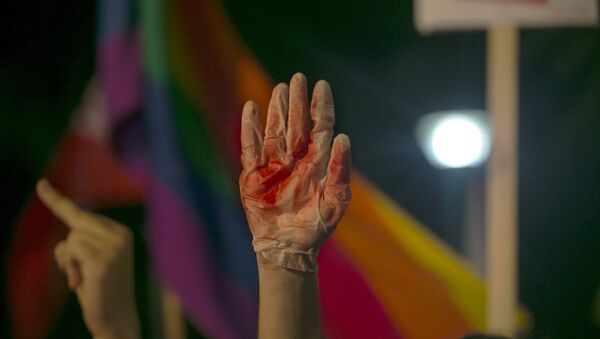Last week, the Israeli parliament voted in favour of a bill that banned the notorious conversion therapies practised in Israel in religious circles, giving hope to many members of the country's LGBT community that their rights will finally be respected.
However, in the neighbouring Palestinian Authority, the future for homosexuals still looks bleak.
Salem Ismail, a 25-year old Palestinian from the West Bank city of Bethlehem, whose real name cannot be revealed for security reasons, says he was attracted to the same sex from his childhood but never dared to share the secret of his sexual orientation with family and close friends.
"I was in 5th grade, when I expressed my feelings for the first time, telling my classmate about my sexual orientation. Many years later, we started seeing each other but that has always been secretive, away from the public eye."
Matter of Life or Death
For Salem, coming out is not a feasible option; for him it has always been a matter of life and death, and that thought has prevented him from sharing his secret with his closest friends and relatives.
"Telling the truth about my sexual preferences would be suicidal. If my family finds out, they will either put me through conversion therapy, disown me or will end up killing me and the problem is that it will be supported by Palestinian society."
In the West Bank as well as many other places in the Middle East, where Islam sets the tone and the norms, homosexuality is regarded as shameful and 'haram' (forbidden), while those who engage in it are often harassed and persecuted.
It is also the reason why the exact number of Palestinian LGBT members is not known to the general public and why the local media prefers not to cover the fight of the small community for equality.
However, there have been exceptions to that rule and some incidents of the persecution of Palestinian LGBTs have made it into the media. Last October, for example, members of the Al Qaws group that fights for sexual and gender diversity in Palestinian society were violently targeted and arrested by the PA's police, whereas two months earlier - in August - Ramallah announced it was banning all LGBT activities as they sharply contrasted with the region's traditional values.
Even in such a relatively open and tolerant city as Ramallah, that has a number of gay bars and pubs, homophobic incidents are not a rare scene.
Such was the case last December, when a transgender woman and two other members of the LGBT community were brutally attacked on a street in Ramallah, stirring an uproar from human rights activists and supporters on social media.
No Future Ahead
Yet, despite that pat on the shoulder, Salem feels that the LGBT community has little chance to get the support of the masses, who live by the strict norms dictated to them by conservatives in their society.
Nor does he count on the support of his own family. "I am already being pressured by my parents, who want me to marry my cousin. So far, I've managed to fend them off by saying that I want to earn money first before I commit to anyone, but I am not sure I will hold out for too long."
And in order to avoid more pressure, Salem thinks that his only way out is to flee to the US or Europe, where the persecution of sexual minorities is prohibited by law.
Some Palestinians have already done it. In the past, it was reported that the UN intervened in a number of cases to resettle less than 20 endangered LGBT Palestinians in Western states. But Salem is not counting on their help, and is hoping to collect enough money to find a solution by himself.
"We will need decades to change the current trend, to alter the way society looks at those who are different. Right now, we are scared of exposing ourselves and unless there is a shift, I prefer to live in a difference place and hopefully I will have enough money to immigrate."


